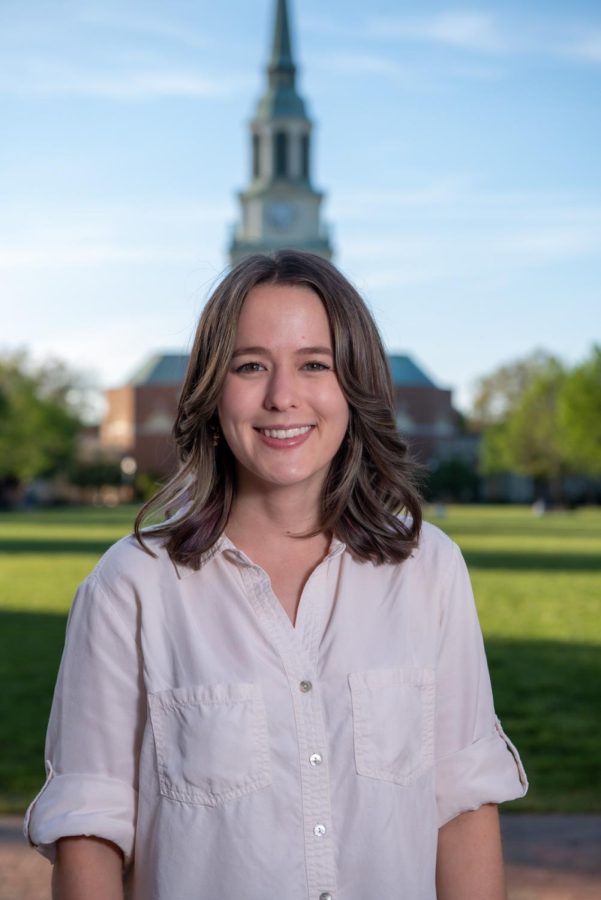Environmental Science: Charlotte Ramirez
Some of Charlotte Ramirez’s fondest memories from her childhood were close to home — and outside. At the Chattahoochee Nature Center in Roswell, Ga., Ramirez learned to love and care for the environment.
“One of my earliest memories of really loving the environment was going to the Chattahoochee Nature Center,” Ramirez said. “[The Chattahoochee River] is a little bit polluted, a little bit murky [and] brown … still, I loved it.”
After initially coming to Wake Forest planning to study biology, Ramirez’s path was steered in a new direction when Wake Forest announced the establishment of the environmental science and environment and sustainability studies majors in the spring of 2020 — Ramirez’s freshman year.
The love for the environment that Ramirez had cultivated on the banks of the Chattahoochee years earlier led her to attend an environmental program interest meeting during her sophomore year at Wake Forest.
Ramirez delved further into the interdisciplinary nature of environmental and sustainability studies through her triple minors in art history, writing and politics and international affairs.
Most recently, Ramirez’s April 13 EarthTalk titled “Building Our Future: Exploring Sustainable Architecture,” discussed the intersection of architecture and sustainability. Art, in particular, is one of Ramirez’s foremost interests when it comes to environmental interdisciplinary study.
“A lot of contemporary art makes commentary on the environment and climate change,” Ramirez said. “It’s an issue that everyone is commenting on in various ways … there’s practical art and architecture as well as people speaking out with more of an activist focus.”
Among Ramirez’s favorite artists are the architect William McDonough and the contemporary visual artist Ai Wei-Wei, a Chinese artist exiled for speaking out against the Chinese government.
In addition to course studies that focused on sustainability, Ramirez has also worked with the Office of Sustainability in various capacities throughout her time at Wake Forest. During the 2022-23 academic year, she served as the office’s alternative transportation intern.
Ramirez will not stop pursuing her passions for socio-environmental study and advocacy after leaving Wake Forest. In the fall of 2023, Ramirez will return to her home state to attend Emory Law School in Atlanta, Ga. There, she hopes to focus on environmental law and build on a knowledge base surrounding environmental law and policy that she began cultivating at Wake Forest in courses she took with Dr. Stan Meiburg in the politics department and Dr. Scott Schang at the law school.
Prior to his current position as the director of the Center for Energy, Environment and Sustainability at Wake Forest, Meiburg worked for the Environmental Protection Agency (EPA) for nearly 40 years. Meiburg’s expertise in the field was instrumental in developing Ramirez’s own interest in environmental law and policy.
“I went on a spring break trip with Meiburg a couple of years ago that delved into environmental policy and the Washington D.C. process … That really solidified for me that I love seeing how environmental issues work in a government setting,” Ramirez remarked about her time in Meiburg’s environmental policy and politics course.
As much as Ramirez has learned about environmental issues in her time at Wake Forest, she’s quick to point out that she has a lot left to discover.
“There are always new things to learn in environmental science and sustainability … this field is a constant process of keeping up to date with the newest information,” Ramirez said.
As she moves beyond Wake Forest and into the future, Ramirez is most excited about doing exactly that as she pursues a J.D. After law school, she anticipates pursuing a career in environmental law in a governmental capacity.
When prompted about what excites her about the future, Ramirez’s response indicated her hope to embody Pro Humanitate beyond Wake Forest.
“[I’m excited about] actually having a career that has an impact,” she said.
